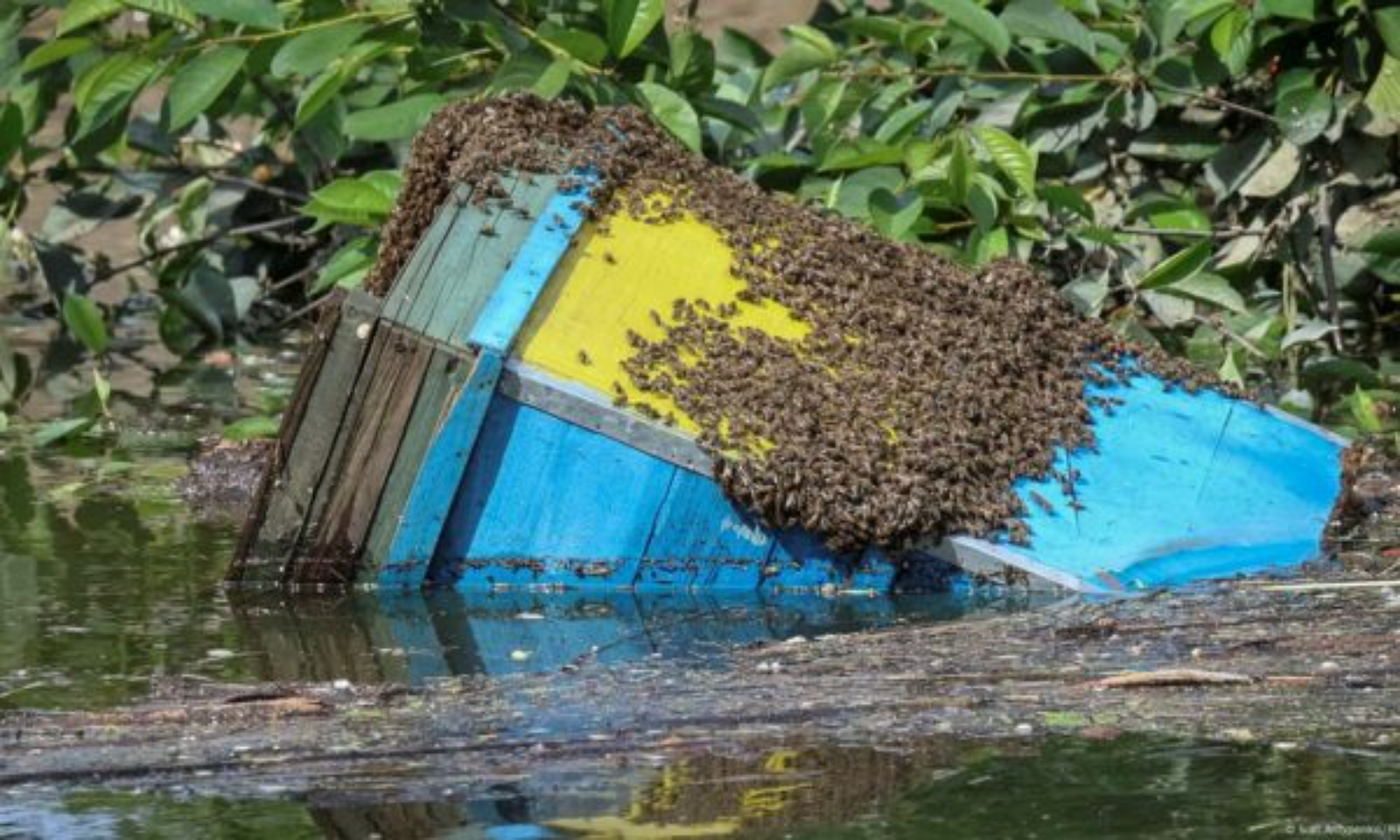Ukraine plans to sue Russia in the International Criminal Court (ICC). The destruction of the environment should also be addressed as a war crime—a landmark decision if it comes to pass.
The world was shocked by the images. On June 6, 2023, explosions occurred at the Kakhovka Dam in southeastern Ukraine. Shortly thereafter, the dam collapsed. Water rapidly inundated the surrounding area, sweeping away entire settlements. Tens of thousands of people were affected, and the exact death toll remains unclear. According to Ukrainian reports, approximately 600 tons of oil leaked from damaged industrial facilities. Chemicals from destroyed factories severely contaminated water, soil, ecosystems, and agricultural land, say UN experts. The war is not only a humanitarian disaster but also an ecological one.
The Kakhovka Dam explosion might now become the subject of a potentially pioneering trial against Russia.
Ukrainian authorities are currently gathering evidence to bring Russia to the ICC in The Hague for war crimes. This includes environmental destruction through military actions. Ukraine accuses Russia of causing the explosion, but Russia denies it.
“Environment must no longer be a silent victim of war,” says Ukrainian Minister for Environmental Protection and Natural Resources, Ruslan Strilets, in an interview with DW.
What does Ukraine want? The dam explosion and flooding are just one of many environmental crimes currently under investigation by Ukrainian authorities, which could become part of the charges against Russia. The Ukrainian Environmental Authority estimates that the damage to forests, land, air, and water caused by the Russian invasion amounts to over 57 billion euros in more than 5,000 cases.
Ukrainian General Prosecutor Andriy Kostin hopes to finalize the indictment framework by the end of the year. “The extent of contamination and damage in many areas can only be guessed at because data collection is extremely difficult,” says Oleksii Vasyliuk, head of the Ukrainian environmental organization Nature Conservation Group.
However, the Ukrainian NGO Ecoaction has managed to collect soil samples from several areas. Analysis of soil in the Donbas combat zone showed that the entire soil is contaminated with highly toxic heavy metals as a result of the fighting. In some cases, levels of mercury, vanadium, and cadmium were over one hundred times the normal level. Heavy metals are extremely toxic in high concentrations because they accumulate in the body and are often not broken down. Vasyliuk says that damage to air, water, and soil will continue to be felt for decades after the war ends.
Minister Strilets demands that Russia be held accountable. Additionally, they want to set a precedent and develop appropriate international law enforcement procedures so that environmental damage from warfare does not go unpunished in the future. However, the process would take many years if accepted by the ICC, says Aaron Dumont. He researches environmental issues in international law at Ruhr University Bochum. For Ukraine, it will also be about the right to claim reparations from Russia.
When is Environmental Damage a War Crime? The United Nations defines environmental destruction as a war crime only if it is disproportionate to the military advantage gained and causes severe, large-scale, and long-term damage to the population.
ICC Chief Prosecutor Karim Khan announced in February that environmental crimes would be prosecuted and receive more focus in the future. To date, no country or person has been convicted for environmental destruction as a war crime. This is partly due to the unclear definition in international law, says Aaron Dumont. “It must be proven that environmental destruction resulting from these bombings or a certain form of warfare can be measured after 10 years,” says Dumont. In the past, this has been very difficult to prove.
Burning of Oil Fields in Iraq As an example, he mentions a case from 1991. During the Gulf War between Kuwait and Iraq, Iraqi troops set fire to over 700 Kuwaiti oil fields while retreating, causing an environmental disaster across the region. Anyone would say this is an environmental war crime, Dumont says. “But in the 1990s, it was very difficult for geologists to demonstrate that the consequences of these fires could be measured even ten years later. This was simply not methodologically possible.”
Today it is different. Thanks to satellite images and more advanced scientific methods, Dumont believes that the chances of success in a court case against Russia are very promising in some instances.
Recognition as Crimes Including the Kakhovka Dam explosion. If there were a court decision, it would be a historic moment. However, it is not certain what effect a conviction would have. Russia is not a party to the Rome Statute, the basis for the ICC’s treaty, and does not recognize ICC decisions.
Dumont points out another aspect. “We know from research that it is very important for those affected that these crimes are recognized. These are, for example, farmers or other people in the region who depend on nature. They want their concerns to be part of this process too.”







